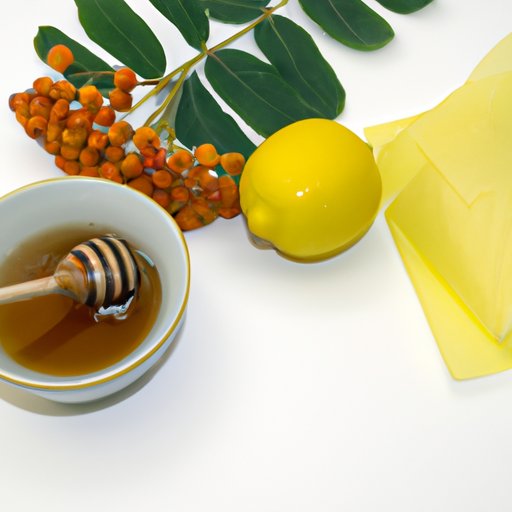
I. Introduction
With the cold and flu season upon us, it’s important to know which cold medicine to take in order to feel better and get back to your daily routine. A common cold can be caused by more than 200 different viruses and may leave you with symptoms like coughing, runny nose, fever, and headache. Choosing the right cold medicine can help you feel better and relieve your symptoms quickly and effectively. This article will provide you with an overview of the best medicines to relieve cold symptoms, expert recommendations, a comparison chart, and advice on natural remedies versus over-the-counter options.
II. 5 Proven Medicines to Relieve Symptoms of a Cold
There are many over-the-counter medicines available to relieve cold symptoms. Below are five that have been proven to be effective in many cases:
- Acetaminophen – This medication can help reduce fever and provide pain relief.
- Nasal sprays – These can help relieve nasal congestion and are available in different strengths.
- Cough syrup – This can help relieve coughing and are available in different formulas.
- Throat lozenges – These can help soothe a sore throat and are available in different flavors.
- Antihistamines – These can help relieve allergy symptoms that often accompany a cold and are available in different formulations.
Each medicine has its own pros and cons. Make sure to do your research and read the labels carefully to determine which one is right for you.
III. Expert Recommendations: Choosing the Best Medicine for Your Cold
There are many different types of cold medicines available. Some are designed to relieve nasal congestion, while others help soothe a sore throat or cough. It’s important to understand the different types and how they work in your body before choosing the right one for your symptoms. When reading the labels, look for the active ingredients and which symptoms they are meant to relieve. Additionally, if you have any medical conditions or are taking any other medications, you should consult with your doctor or pharmacist before taking any new medication.
IV. The Ultimate Guide to Cold Medicines: Which One Is Right for You?
To help you decide which medicine is best for your cold symptoms, we’ve created an in-depth comparison chart. It includes the active ingredients, possible side effects, and drug interactions of the most popular cold medicines.
| Cold Medicine | Active Ingredients | Side Effects | Drug Interactions |
|---|---|---|---|
| Tylenol Cold | Acetaminophen, dextromethorphan, pseudoephedrine | Nausea, headache, dizziness, nervousness | MAO inhibitors, blood pressure medications, thyroid medications |
| Nyquil | Acetaminophen, dextromethorphan, doxylamine succinate | Drowsiness, dry mouth, constipation, stomach upset | Alcohol, sedatives, tranquilizers, antihistamines |
| Mucinex | Guaifenesin | Nausea, vomiting, headache, dizziness | None known |
| Zicam | Zincum aceticum, zincum gluconicum | Irritation, burning, sneezing, loss of smell | None known |
| Robitussin AC | Codeine, guaifenesin | Dizziness, drowsiness, upset stomach, mild nausea | MAO inhibitors, alcohol, sedatives, tranquilizers |
Make sure to weigh the benefits and risks of each medicine before making a decision. What works for one person may not work for another.
V. Natural vs. Over-the-Counter Cold Medicines: What Works Best?
Some people prefer natural remedies to over-the-counter cold medicines. While there are some remedies that have been proven to be effective, others have not been backed up by scientific studies. Here are some natural remedies as well as their scientific evidence:
- Echinacea – There is mixed evidence on whether echinacea can help reduce the duration and severity of colds.
- Zinc lozenges – These lozenges have been shown to reduce the duration of colds in some studies.
- Herbal teas – While they may help soothe sore throats and provide comfort, there is little scientific evidence to support their efficacy in treating colds.
- Vitamin C – Studies show that while vitamin C may not prevent colds, it can reduce the severity and duration of the symptoms.
- Chicken soup – Research suggests that chicken soup can help reduce inflammation and the duration of colds.
While natural remedies have their own benefits, over-the-counter cold medicines are still the most efficient way to relieve cold symptoms quickly. If you have any doubts, talk to your doctor or pharmacist before trying natural remedies.
VI. Understanding Cold Medications: How They Work and Which Ones to Choose
If you’re new to cold medications, it’s important to know how they work in your body and which symptoms they’re best suited for. Here are some examples of the different types of cold medications and how they function:
- Decongestants – These medications help relieve nasal congestion by narrowing the blood vessels in the nasal passages.
- Antihistamines – These medications block histamine, a substance that causes allergic reactions like sneezing and runny nose.
- Cough suppressants – These medications help reduce coughing by suppressing your cough reflex.
- Expectorants – These medications loosen and thin mucus in the airways, making it easier to cough up.
- Pain relievers – These medications help relieve headaches, sore throat, and other pains associated with the flu and colds.
Make sure to read the labels carefully and choose the medication that best suits your symptoms.
VII. Conclusion
Choosing the right medicine for your cold can be a bit overwhelming, but this article has provided you with the essential information to make an informed decision. Remember to read the labels carefully, consider your specific symptoms, and talk to your doctor or pharmacist if you have any doubts or concerns. Combining over-the-counter cold medicines with natural remedies like chicken soup, teas, or honey can help speed up the healing process.





